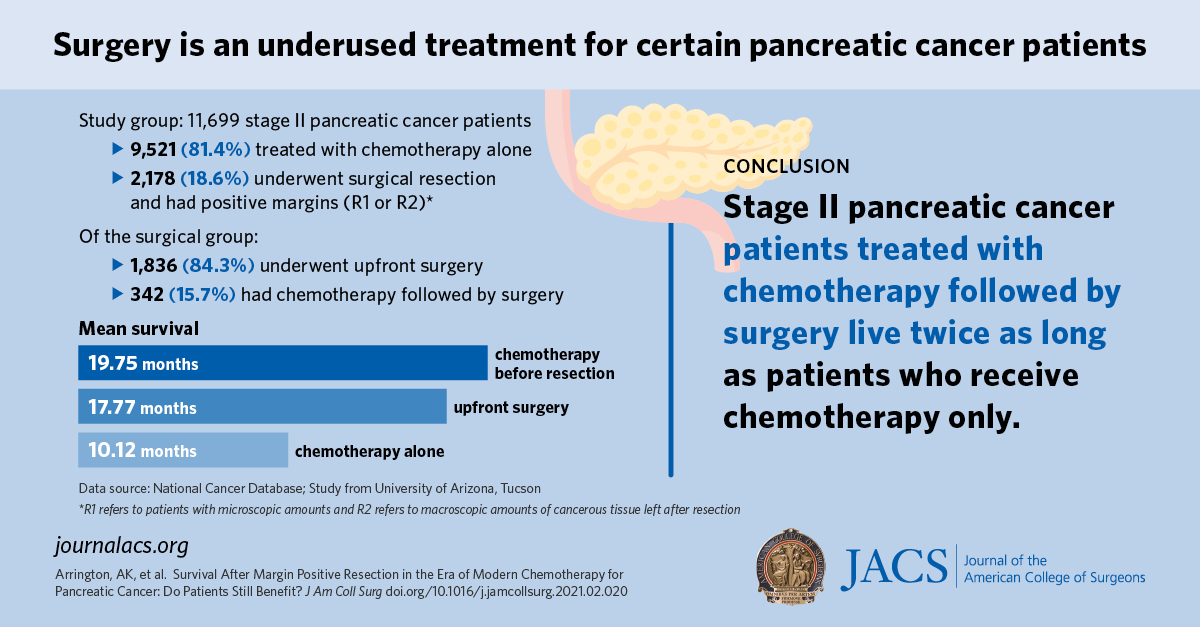CHICAGO: Patients with stage II pancreatic cancer who are treated with chemotherapy followed by resection (an operation that removes the cancerous part of the organ, structure or tissue) live nearly twice as long as patients who receive only chemotherapy, according to a new Journal of the American College of Surgeons study published online in advance of print.
In stage II patients, there is a chance that pancreatic cancer can be removed by resection even after it has spread close to blood vessels. Although chemotherapy can improve outcomes, the risk of surgery is justified because the patients live longer even if the cancerous tissue is not entirely removed, according to the study from researchers at the University of Arizona Department of Surgery, Tucson.
Surgery can improve survival
The researchers found that patients who received chemotherapy followed by resection lived an average of 19.75 months, while those who received only chemotherapy lived an average of 10.12 months. They examined data from the National Cancer Database (NCDB), a joint program of the American College of Surgeons and the American Cancer Society.
“Our results show that surgery is viable in more cases than we thought,” said Amanda K. Arrington, MD, MHM, FACS, a surgical oncologist at the University of Arizona Department of Surgery, Tucson.
Pancreatic cancer is the fourth leading cause of cancer deaths in men and women in the U.S.1,2 Survival rates for pancreatic cancer are low because it is a fairly aggressive, fast-growing cancer, Dr. Arrington said. Approximately 10 to 30 percent of these patients present with disease in which resection may be considered an appropriate therapy. Chemotherapy can improve the chances for successful surgery, as about one in three borderline cases are resectable following chemotherapy.3 Even after surgery, however, it is common for pancreatic cancer to return.
While the goal of resection is to remove all of the tumor tissue, it can be difficult to accomplish, especially if the cancer has spread to nearby blood vessels that feed the liver and small intestine. Margin status, or how much cancerous tissue is left post-surgery on the edges of the resected area, is a significant predictor of survival after surgery for pancreatic cancer. Patients with no cancerous tissue left after resection (R0) have improved survival compared with patients with microscopic amounts (R1) or macroscopic amounts (R2) of cancerous tissue left after resection. This study looked at R1 and R2 resection outcomes compared with chemotherapy alone.
Study details
Dr. Arrington and her colleagues searched NCDB data from 2010 to 2015 for stage II pancreatic cancer patients who underwent R1/R2 surgery with or without pre-operational chemotherapy to compare to stage II patients who received chemotherapy alone. They found:
- Out of a total of 11,699 stage II pancreatic cancer patients, 9,521 (81.4 percent) were treated with chemotherapy alone, while 2,178 (18.6 percent) underwent surgical resection and had positive margins (R1 or R2).
- Of the surgical group, 1,836 (84.3 percent) underwent upfront surgery and 342 (15.7 percent) had chemotherapy followed by surgery.
- The R1 or R2 patients that had chemotherapy before resection had the best overall survival at a mean of 19.75 months, followed by the upfront surgery group with a mean survival of 17.77 months, and the chemotherapy alone group with a mean survival of 10.12 months.
The data was analyzed in multiple ways to address potential bias; all analyses of the data delivered the same findings.

